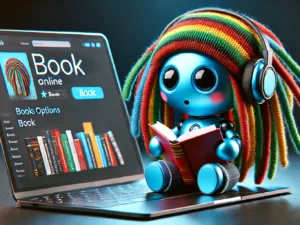Finding time to read can be tough. With busy schedules, work, and personal responsibilities, many people feel like there’s just no time left to sit down with a good book.
You may want to read more, but the thought of getting through an entire book can feel overwhelming.
That’s where AI (Artificial Intelligence) comes in. AI offers tools that make reading easier, faster, and less stressful.
From speeding up your reading to recommending the best books for your interests, AI can help you fit more books into your life, even with a tight schedule. And the best part?
You can enjoy more books without adding extra pressure to your day.
That’s why, I will be walking you through different ways AI can help you read more books in less time, so you can rediscover the joy of reading without the stress of actually doing it.
Let’s go;
How AI Help You Read More Books
1. AI Summaries: Get the Key Points of a Book Fast

One of the easiest ways to read more books in less time is by using AI-powered tools to get summaries. Instead of reading an entire book, you can use AI to provide you with the key points in just a few minutes.
This is great for non-fiction or educational books where you mainly want the main ideas without going through every page.
For example, tools like Blinkist and SummarizeBot are excellent at creating book summaries. Blinkist offers quick 15-minute summaries of non-fiction books, covering topics like business, self-help, and science.
You can easily fit a few summaries into your day, like while you’re having breakfast or commuting. On the other hand, SummarizeBot can even summarize articles or research papers, helping you quickly digest important information from various sources.
These AI tools don’t replace reading entire books, but they’re perfect when you want to decide if a book is worth your time or if you need a quick refresher on a topic you’ve read before.
They save time and let you get the most important information without the pressure of finishing long books.
If you want to get through books faster, AI-powered speed reading tools can help you train your brain to read more efficiently without feeling overwhelmed.
2. Speed Reading: Let AI Help You Read Faster

These tools don’t just push you to read faster—they actually teach you how to focus and absorb more information in less time.
For example, Spreeder is a popular AI speed reading app that helps you practice reading more quickly by showing text one word or phrase at a time.
This method reduces distractions and keeps your eyes moving smoothly across the text. It’s a great way to build up your reading speed while still understanding what you’re reading.
Another helpful tool is Acceleread, which offers personalized speed reading training sessions. It tracks your progress and adjusts the speed based on how well you’re doing, making sure you’re not just reading faster, but also comprehending better.
Speed reading with AI is all about building a habit. These tools help you practice regularly, so over time, you’ll notice you can read books faster without sacrificing understanding.
3. Listen to Books with AI Audiobooks
If you’re too busy to sit down and read, AI-powered audiobooks are a great way to “read” more while doing other tasks.
Whether you’re cooking, or exercising, you can listen to a book on the go, which is perfect for squeezing more reading time into your day.
Apps like Audible and Google’s text-to-speech use AI to narrate books, turning any written content into an audiobook.
You can listen while you’re walking the dog or driving to work. This way, you can finish a book without having to find extra time in your day to sit down and read.
Another AI-powered tool to consider is Speechify, which turns any text (like PDFs, articles, or even emails) into spoken audio.
This means you can easily turn those documents or e-books you’ve been meaning to read into audio and listen to them whenever it’s convenient.
Listening to books through AI audiobooks makes it easier to fit more reading into your life without stressing over finding dedicated reading time.
4. Personalized Book Recommendations with AI

One of the biggest challenges with reading is deciding what book to pick up next. AI makes this process easier by offering personalized book recommendations based on your reading history and preferences.
Instead of spending time searching through endless lists, AI tools can suggest books that match your tastes, saving you time and effort.
For example, apps like Goodreads and StoryGraph use AI to analyze the books you’ve already read and liked.
They then recommend similar books you’re likely to enjoy, taking into account your favorite genres, themes, and even your reading habits.
If you enjoyed a mystery novel, these apps might suggest another suspenseful book by a different author that fits your style.
AI-powered book recommendations don’t just stop at suggesting popular titles—they go deeper into what you personally enjoy.
This way, you spend less time searching for the right book and more time reading, knowing that the next book is likely to be one you’ll love.
5. AI Tools Help You Understand and Remember More
Sometimes, reading can feel boring when you’re dealing with complicated ideas or information-heavy books.
This is where AI can step in to help you not only understand the content better but also retain it. AI tools break down tough concepts into simpler terms and help you remember what you’ve read.
For example, tools like ChatGPT can explain confusing sections of a book. Let’s say you’re reading a challenging chapter on economics, and you don’t fully get the concept.
You can paste that section into ChatGPT and ask for a simpler explanation. This way, you won’t get stuck trying to figure things out on your own.
If you want to improve your memory of what you’ve read, AI apps like Quizlet allow you to create flashcards and quizzes based on the book’s key points.
This helps reinforce your knowledge and ensures that important concepts stick with you long after you’ve finished the book.
AI makes it easier to both comprehend and retain information, so you can read more efficiently and actually remember what you’ve learned.
6. Track Your Reading Habits with AI

Keeping track of your reading progress can be a great motivator, and AI makes it easier to stay on top of your reading goals. By using AI-powered apps, you can set goals, track how many pages you’ve read, and even find the best times during the day to read.
Apps like Bookly and Basmo are designed to help readers stay on track. For example, Bookly lets you log your reading sessions, set daily or weekly goals, and even get reminders to read.
You can track how many minutes you spend reading each day and see how many books you’ve finished over time. It also gives you insights into your reading speed, so you can work on getting faster if that’s your goal.
Another useful app, Basmo, allows you to plan your reading schedule around your busiest times. The AI suggests when to read based on your habits, ensuring you get some reading done without feeling rushed or stressed.
With AI’s help, you can keep your reading routine organized, meet your goals, and fit reading into even the busiest schedule.
Combining AI Tools for a Better Reading Experience
To really get the most out of AI for reading, you can combine different AI tools to create the perfect reading setup.
By mixing AI summaries, audiobooks, speed reading apps, and habit trackers, you can create a system that lets you read more books in less time without feeling overwhelmed.
For instance, you could start with an AI-generated summary from Blinkist to get the key points of a book.
If you like what you read, switch to an audiobook version on Audible and listen while you’re driving or doing chores. When you have more time to focus, use a speed-reading app like Spreeder to get through longer sections quickly.
To keep everything organized, you can use a tracking app like Bookly to set goals, monitor your progress, and make sure you’re sticking to your reading routine.
By combining these tools, you can maximize your reading time and make the process stress-free.




